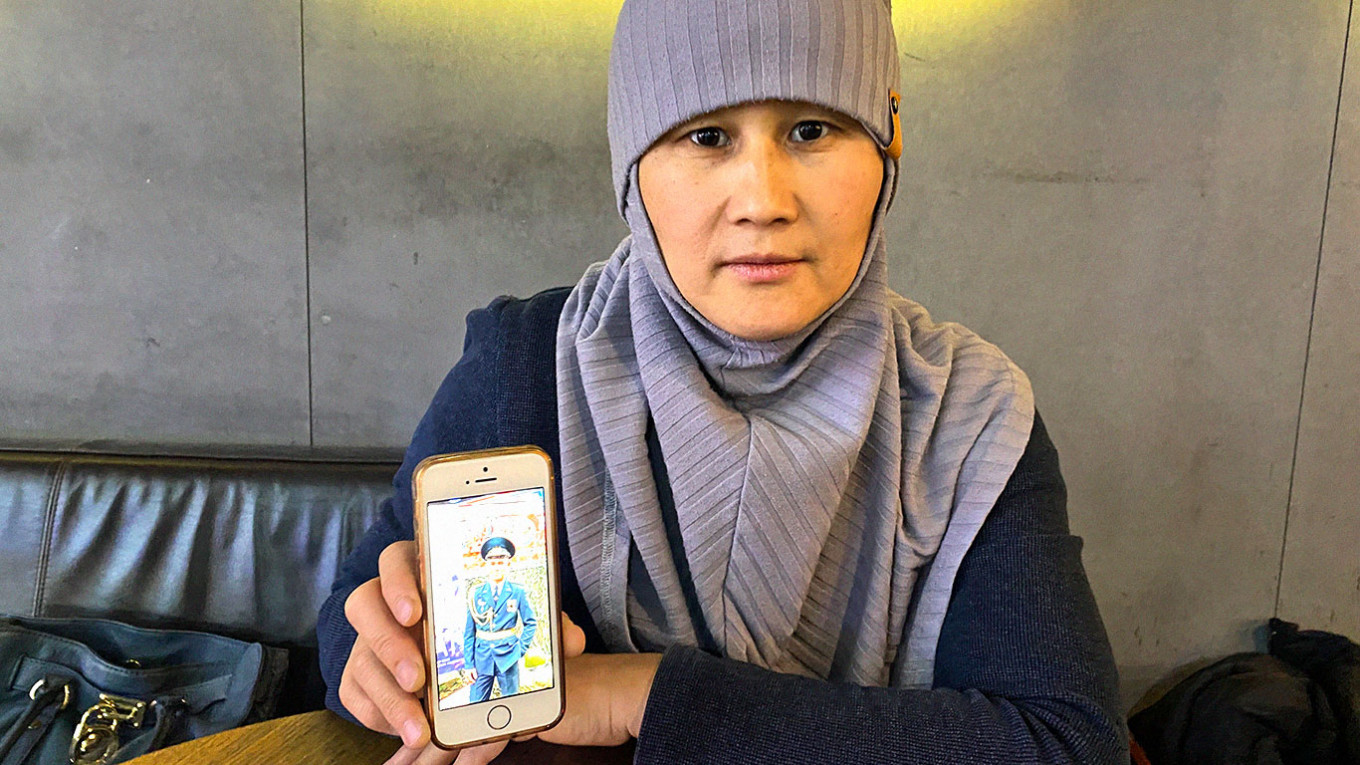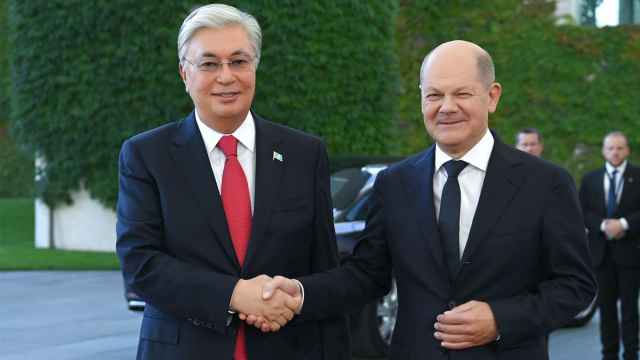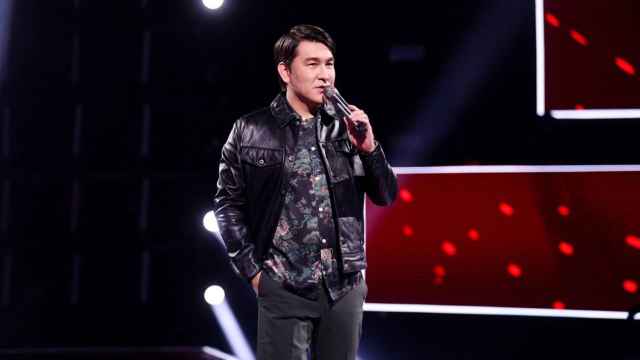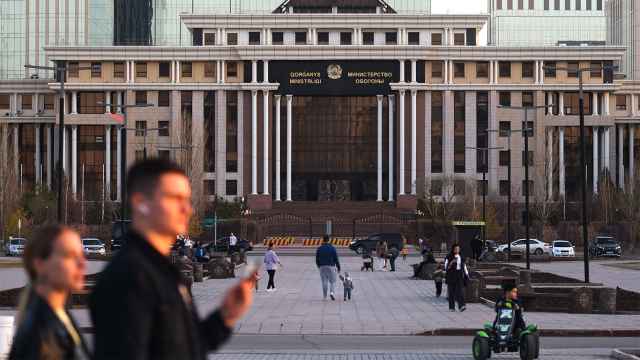ALMATY, Kazakhstan — When anti-government protests erupted across Kazakhstan, seasoned activist Kulbarshin Erezhepova didn’t think twice about heading to the main square in the country’s commercial capital Almaty to show her opposition to the regime.
What she didn’t know was that among the hundreds gathered there on Jan. 5 was her 20-year-old nephew Margulan Bektersin, who had taken to the streets for the first time. And after seeing police shoot protesters she started to fear the worst when she heard he hadn’t returned home that evening.
“We searched the hospitals and morgues until we found his body stacked among dozens of other young bodies the next day,” an emotional Erezhepova told The Moscow Times, showing a picture of her nephew on her smartphone.
Witnesses on the square told Erezhepova that Bektersin had been shot in the hip by riot police, and officials told her he died on the way to the hospital.
“He was a peaceful student, a good guy who just wanted to change the dire situation the country is in,” said Erezhepova, who alleges that her brother has since been pressured by the authorities not to speak out about his son’s death.
In the wake of the protests — and with communications in the Central Asian nation restored after a total shutdown at the height of the crisis — reports of indiscriminate beatings and police torture across the country are surfacing and activists are trying to determine the full extent of the crackdown during the week of violence.
The largest and most deadly protests in Kazakhstan’s history broke out on Jan. 2 in the western oil city of Zhanaozen over a hike in fuel prices. They soon spread across the country and widened their focus to corruption, economic inequality and discontent with former leader and power behind the throne Nursultan Nazarbayev.
The unrest led to the dismissal of the government by Kazakhstan's current president Kassym-Jomart Tokayev, who requested help from the Russian-led Collective Security Treaty Organization (CSTO) to win back control of the country.
At the height of the unrest, Tokayev said he had ordered troops to shoot to kill protesters without warning.
The official death toll is 225, with nearly 10,000 detained. The authorities have justified their harsh response by pinning the protests on both foreign and domestic “bandits and terrorists.”
Rights activists, however, say the authorities are withholding information on those killed and demanding answers and accountability.
“We do not know who was killed or how they were killed. We are forced to compile our own lists,” said Dana Zhanay, a human rights activist who took part in the protests in Almaty.
“We hear new stories every day of people who died, are still missing, or were tortured during the unrest,” she said.
Sergey Shutov, 38, said he was arrested on Jan. 11 after attending protests in the city of Atirau in oil-rich Western Kazakhstan, one of the first places in the country to see unrest.
He said security services brought him to a gym on the outskirts of town where they repeatedly beat him and dozens of others.
“I begged them to stop kicking me. I had to promise I would never join a meeting again,” Shutov said.
Random bystanders in Almaty who said they had not been involved in the unrest told The Moscow Times they had been targeted by the authorities during the protests.
Pensioner Bibigul Ismailova, 65, said she was driving through the city with a friend to help her with house repairs when police officers opened fire on her car.
“There was no signal so we had no idea what was going on. We couldn’t imagine they would shoot. How can they kill their own people? Only a dictatorship could do this,” said Ismailova, who was unharmed in the incident.
In a video Ismailov shared with The Moscow Times, her car can be seen under fire as she drives it through Almaty. She said she was afraid of publishing the footage on social media for fear of repercussions from the authorities.
Government officials did not immediately respond to requests for comment about the allegations of violence.
Last Friday, Tokayev wrote on Twitter: “Those who committed serious crimes will be punished in accordance with the law,” stressing that “bandits and terrorists” were behind the mass protests.
Erezhepova and other protesters across the country told The Moscow Times that “violent organized crime groups'' had appeared during the protests, and blamed them for much of the mass looting in Almaty and other cities.
However, they accuse the authorities of using the threat of the more aggressive elements to disproportionately crackdown on peaceful protesters.
“Peaceful protesters, not bandits, were killed right in front of me,” Zhanay claimed.
Outward calm
On Tuesday, life in Almaty was returning to normal, with the city's metro and other facilities back in service.
Police presence was high and there were a number of burned-out buildings — including the mayor’s office — dotted across the city, but people were commuting to work and the chaos seen just two weeks earlier had subsided.
Despite the outward calm, many who attended the protests said they are now living in fear of arrest and persecution.
The Kazakh authorities have encouraged citizens to send them footage of the protests to allow them to identify and gather evidence against “criminals who participated in the meetings.”
“We are just sitting here and waiting. I have my suitcase ready as if it was 1937, preparing for them to come for me,” said activist Zhanay, referring to the period of repression in the Soviet era under Stalin.
“They know our faces,” she added.

In a bid to win back popular support, Tokayev has announced a series of populist measures, including setting up a new fund for public services to which wealthy local businessmen will be asked to contribute.
He also appears to be tightening his grip on power at the expense of the former president by reshuffling the government.
On Tuesday, in his first appearance since the unrest, Nazarbayev described himself as “just a pensioner,” saying Tokayev held “full power.”
Most activists, however, said Tokyaev is unlikely to follow through with actual reforms, and that they fear a further crackdown on civil society.
“There is no way back for Tokayev. The people of Kazakhstan have seen what this regime is capable of, he has blood on his hands,” said Aset Abishev, a veteran opposition activist.
Abishev said he was arrested on the day the protests started. He alleged that he was beaten and tortured for four days before being released when things calmed down. Pictures published by Abishev on his social media after his release showed him covered in purple bruises.
He said he believes the government’s violent actions will only turn more people against the regime.
“The calm you see now on the street, it's just the calm before the storm.”
A Message from The Moscow Times:
Dear readers,
We are facing unprecedented challenges. Russia's Prosecutor General's Office has designated The Moscow Times as an "undesirable" organization, criminalizing our work and putting our staff at risk of prosecution. This follows our earlier unjust labeling as a "foreign agent."
These actions are direct attempts to silence independent journalism in Russia. The authorities claim our work "discredits the decisions of the Russian leadership." We see things differently: we strive to provide accurate, unbiased reporting on Russia.
We, the journalists of The Moscow Times, refuse to be silenced. But to continue our work, we need your help.
Your support, no matter how small, makes a world of difference. If you can, please support us monthly starting from just $2. It's quick to set up, and every contribution makes a significant impact.
By supporting The Moscow Times, you're defending open, independent journalism in the face of repression. Thank you for standing with us.
Remind me later.







